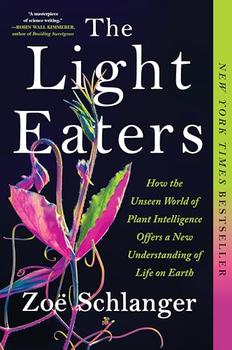Summary | Excerpt | Reviews | Beyond the book | Read-Alikes | Genres & Themes | Author Bio

How the Unseen World of Plant Intelligence Offers a New Understanding of Life on Earth
by Zoë SchlangerThe human race is completely dependent on plants. Many people, however, give little thought to plants' importance, often seeing them as closer to inanimate objects than fellow living things. Science journalist Zoë Schlanger challenges that view in her engrossing book The Light Eaters, which explores current knowledge of how plants experience the world around them.
The first two chapters provide background for the concept of plant behavior, the field of botany and the broader process of science. Schlanger explains how scientists' reluctance to accept new ideas that challenge existing paradigms both slows scientific discovery and acts as a "bulwark against quackery." She discusses Peter Tompkins and Christopher Bird's 1973 book The Secret Life of Plants, which gained bestseller status but contained such a "mix of real science, flimsy experiments, and unscientific projection" that it made research into plant behavior effectively off limits for decades. Subsequent chapters explore the ways in which plants communicate with each other and with animals, including both driving off pests and attracting pollinators, and evidence for how plants register light, sound and even pain.
Schlanger's book contains a lot of discussion of ongoing research and areas of current debate, such as the continuing disagreements over the mechanism by which Boquila trifoliolata, a vine native to Chile and Argentina, mimics the appearance of other plants (see Beyond the Book). This approach gives readers exciting insight into the current state of the field and a view of science in progress. It does mean, however, that large parts of the book are likely to become outdated relatively quickly. The focus on current research also means that this is not a book for readers who want definitive answers to the questions it raises, as many aspects of the topics discussed remain unresolved and even mysterious.
The author's passion for her topic shines through in her writing. The focus is on the science, but interspersed with the information on plants are accounts of the places she went and people she met during her research trips, making the discoveries shared feel more personal. Her sense of wonder at experiences—such as seeing fluorescent proteins in a genetically modified plant light up in response to her pinching—is contagious.
The negative side of that passion is that at times she seems to dismiss factors that might cast doubt on the theories she is interested in. For instance, she mentions a researcher whose career suffered after admitting to "taking ayahuasca in a shamanic ritual in Peru and communing with the spirit of the plant, who told her how to best design her studies." Schlanger portrays the institutional response to this researcher as based in sexism and an insular mindset. While I would never argue that sexism is not a problem in the sciences, Schlanger's own description of the researcher's work made me think there was good reason to question her study design. Schlanger's handling of this particular issue reduced my trust in her assessments of the validity of other studies throughout the book.
Despite these concerns, The Light Eaters offers an engrossing view into the plant world, focusing not on plants' utility to humans or humans' ecosystems, but on how they experience and interact with the world around them. I would recommend The Light Eaters to readers of popular science regardless of whether they have any particular interest in plants, as I think it's likely to spark that interest if they don't possess it already.
![]() This review was originally published in The BookBrowse Review in May 2024, and has been updated for the
June 2025 edition.
Click here to go to this issue.
This review was originally published in The BookBrowse Review in May 2024, and has been updated for the
June 2025 edition.
Click here to go to this issue.

If you liked The Light Eaters, try these:

by Jessica J. Lee
Published 2025
A prize-winning memoirist and nature writer turns to the lives of plants entangled in our human world to explore belonging, displacement, identity, and the truths of our shared future

by Tao Leigh Goffe
Published 2025
A groundbreaking investigation of the Caribbean as both an idyll in the American imagination and a dark laboratory of Western experimentation, revealing secrets to racial and environmental progress that impact how we live today.
Your guide toexceptional books
BookBrowse seeks out and recommends the best in contemporary fiction and nonfiction—books that not only engage and entertain but also deepen our understanding of ourselves and the world around us.